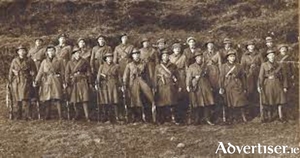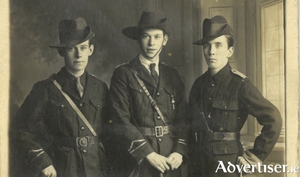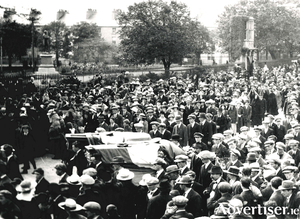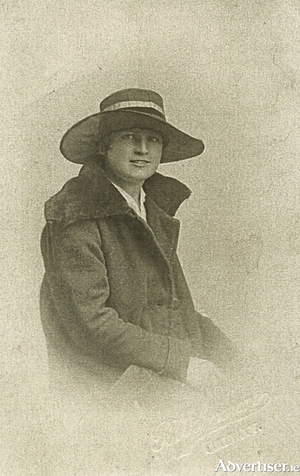Search Results for 'Edward Krumm'
6 results found.
Wild nights of burning and murder

Clifden was not the only town to experience the terror of British forces running wild, shooting, and setting fire to buildings. The previous year, July 19 1920, Tuam suffered a similar experience as Clifden, only mercifully no resident was killed on that occasion.
100 years since Galway’s 'Night Of Terror'

THIS WEEK marks the centenary of one of the darkest episodes in the history of Galway as violence erupted on its streets resulting in a “night of terror” that left three young men dead.
A violent night in Galway

Edward Krumm was 5ft 11in, 26 years old, a bachelor and a member of the Church of England from Middlesex. He was a lorry driver with the Black and Tans and had been in Galway three weeks when he arranged to meet a civilian driver he had come to know in a pub in Abbeygate Street. This man, Christopher Yorke, described Krumm as a “generally reckless fellow who drank a lot”. Krumm was fairly drunk, brandishing a revolver and bragging that he could knock the neck off a bottle at 10 yards' range, and apparently shot at a few bottles in the pub.
‘No time for fainting’

‘The small girl smiles. One eyelid flickers. She whips a pistol from her knickers. She aims it at the creature’s head. And bang bang bang, she shoots him dead.’
1916 - 1922 A time of courage, and divided loyalties
I have written before about a terrifying night in Galway when the Black and Tans went berserk following an incident at Galway railway station on September 8 1920. A drunken Tan, Edward Krumm, confronted the crowd of passengers as they emerged from the train. He produced a pistol and began to fire into the air, causing widespread panic. Séan Mulvoy jumped on his back but Krumm managed to shoot him as they fell to the ground. In turn a man stepped from the crowd and shot Krumm dead.
‘The Galway Resolution’ - An attempted coup by some county councillors
On December 3 1920, at the height of the War of Independence, quite an extraordinary event happened in Galway County Council. It passed a resolution, known as ‘The Galway Resolution’, repudiating the authority of the newly established Dáil; it rescinded the resolution for the collection of rates, (which were collected locally, and passed on to Dáil Éireann, and not to the British authorities), and incredibly, Galway County Council now offered its offices to negotiate peace, directly with the British prime minister, David Lloyd George.

